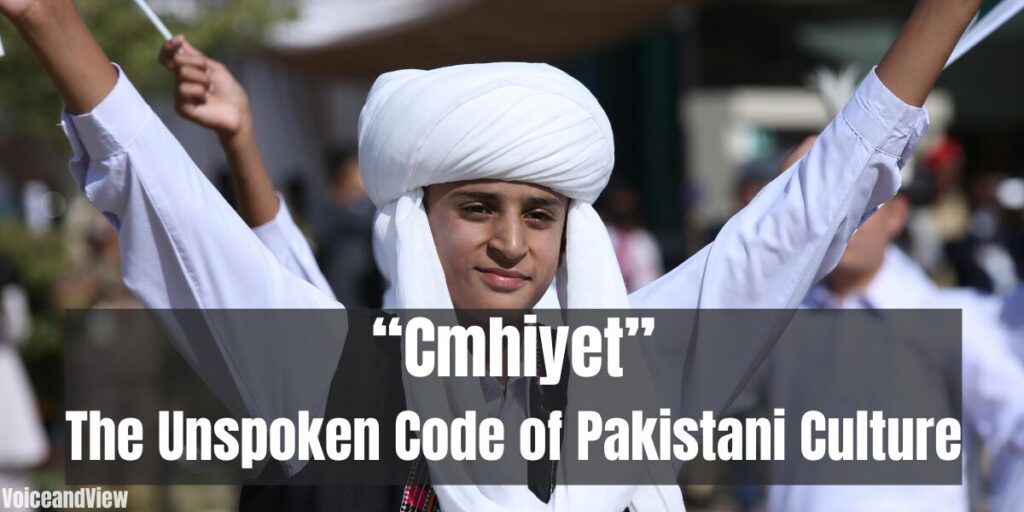Demystifying Cmhiyet: Master Pakistani Society

While cmhiyet undoubtedly strengthens social bonds and fosters a sense of community, it’s not without its complexities. Here’s a closer look at some potential challenges associated with this concept:
Contents
- 1 Social Pressure and Individuality:
- 2 Perpetuating Social Hierarchies:
- 3 Challenges in a Modern World:
- 4 The Roots and Variations of Cmhiyet
- 5 Key Components of Cmhiyet:
- 6 Cultural Nuances:
- 7 The Duality of Cmhiyet: Strength and Potential Challenges
- 8 Everyday Cmhiyet: Practical Strategies for Modern Life
- 9 Cmhiyet: A Cornerstone in Flux
- 10 Cmhiyet FAQs
Social Pressure and Individuality:
Cmhiyet’s emphasis on collective well-being can sometimes create pressure to conform to societal expectations. Individual desires and ambitions might be downplayed in favor of upholding family honor or fulfilling obligations to extended kin. This can hinder personal growth and limit individual choices.
Perpetuating Social Hierarchies:
Its inherent respect for elders and social hierarchy can, at times, reinforce existing social inequalities. Younger generations or those from lower social classes might find it difficult to voice their opinions or challenge traditional norms.
Challenges in a Modern World:
As Pakistan integrates with the globalized world, the concept of cmhiyet faces new challenges. Balancing traditional obligations with individual aspirations and navigating it in multicultural environments requires a nuanced approach.
Understanding these complexities is crucial for effectively navigating cmhiyet in contemporary Pakistani society. In the next section, we’ll explore practical tips for navigating it in everyday life.
The Roots and Variations of Cmhiyet
Its origins are deeply intertwined with the social fabric of Pakistan. Here’s a breakdown of its historical roots, core elements, and regional variations:
Origins and Evolution:
Cmhiyet’s roots can be traced back to the ancient social structures of the Indus Valley Civilization and the emphasis on communal living. The arrival of Islam further reinforced concepts of respect for elders, fulfilling obligations to kin, and maintaining social harmony. These values became embedded in the cultural DNA of various ethnicities that make up Pakistan today.
Over time, it has adapted to changing social realities. While its core principles remain strong, the ways they manifest might differ. For instance, with the rise of nuclear families in urban areas, the dynamics of extended family obligations within cmhiyet might have shifted slightly.
Key Components of Cmhiyet:
It is a multifaceted concept, but some core elements underpin it:
Respect ( عزت , Izzat):
Deep respect for elders, authority figures, and those deserving of honor is a cornerstone of cmhiyet. It dictates behavior, communication styles, and decision-making processes.
Honor (غیرت , Ghairat):
The concept of honor, encompassing family reputation and protecting oneself from shame, is intricately linked to cmhiyet. Upholding family honor often takes precedence over individual desires.
Obligation ( فرض , Farz):
Fulfilling one’s obligations to family, community, and society is a key tenet of it. This includes helping those in need, attending social gatherings, and maintaining strong family ties.
Reciprocity (بادلہ , Badla):
The idea of reciprocity ensures a balanced exchange within cmhiyet. Favors are expected to be returned, and respect needs to be earned.
Cultural Nuances:
The expression of cmhiyet varies across Pakistan’s diverse regions and ethnicities. Here are some examples:
Pukhtoonwali (پختونوالی) in Pashtun culture:
Places a strong emphasis on hospitality, courage, and honoring one’s word.
Sindhi Sarmachar (سِندهي سَرماچار) in Sindhi culture:
Emphasizes social harmony, respect for elders, and maintaining good relations with extended family.
Riwaj (رِواج) in Baloch culture:
Focuses on tribal loyalty, collective decision-making, and protecting the honor of the tribe.
Understanding these regional variations is crucial for effectively navigating it in different social contexts within Pakistan.
The Duality of Cmhiyet: Strength and Potential Challenges
Its influence in Pakistani society is a double-edged sword. Here’s a closer look at its positive and negative aspects, along with navigating it in a modernizing world.
Positive Aspects of Cmhiyet:
It acts as the social glue that binds Pakistani communities. It fosters strong social bonds through:
- Respect for Elders: The emphasis on respecting elders creates a support system where younger generations learn from the wisdom and experience of their seniors.
- Obligation and Reciprocity: The concept of fulfilling obligations and maintaining reciprocity encourages cooperation and mutual support within families and communities. People are more likely to help each other knowing favors will be returned.
- Sense of Community: Cmhiyet promotes a strong sense of belonging and collective identity. Individuals feel a responsibility towards the well-being of the larger group, fostering a spirit of community.
These aspects contribute to a stable and supportive social environment, where individuals can rely on their social networks for help and guidance.
Challenges of Cmhiyet:
Despite its positive aspects, it can also pose challenges:
- Social Pressure and Individuality: The emphasis on collective good and respecting elders can sometimes create immense social pressure. Individual desires and ambitions might be downplayed to avoid bringing shame or dishonor to the family. This can hinder personal growth and limit individual choices.
- Perpetuating Social Hierarchies: Cmhiyet’s inherent respect for social hierarchy can reinforce existing inequalities. Younger generations or those from lower social classes might find it difficult to challenge traditional norms or express their opinions freely.
- Navigating a Modern World: As Pakistan integrates with the globalized world, it faces new challenges. Balancing traditional obligations with individual aspirations and navigating it in multicultural environments requires a nuanced approach.
Balancing Cmhiyet with Modernity:
In today’s Pakistan, navigating it effectively requires a delicate balance between tradition and progress. Here are some ways to achieve this:
- Open Communication: Fostering open and honest communication within families is key. Younger generations can express their aspirations while respecting elders’ perspectives.
- Setting Healthy Boundaries: It’s important to establish healthy boundaries that respect cmhiyet while allowing for individual growth. Openly discuss limitations or explain reasons for declining requests.
- Adapting Traditions: Traditions can evolve while upholding core values. For instance, decision-making processes within families can incorporate the views of younger generations while still respecting elders’ roles.
By embracing open communication, setting healthy boundaries, and adapting traditions, individuals can navigate it effectively in a globalized world. It can continue to be a source of strength and social cohesion while allowing for individual growth and progress.
Everyday Cmhiyet: Practical Strategies for Modern Life
Understanding cmhiyet’s nuances is just the first step. Here are some practical tips for navigating this concept in everyday situations:
Communication is Key:
Open and honest communication is essential for upholding it. Express your needs and opinions clearly, but always maintain a respectful tone. This is especially important when addressing elders or those in positions of authority. For instance, instead of bluntly refusing a request from an elder, explain your limitations politely and offer alternative solutions if possible.
The Art of Compromise:
Cmhiyet often involves finding common ground. Be prepared to compromise while ensuring your own needs are heard. During family gatherings or decision-making processes, actively listen to others’ perspectives and seek solutions that consider everyone’s well-being.
Respectful Disagreement:
While respecting elders is paramount, respectful disagreement is also possible within it. Frame your arguments thoughtfully and avoid confrontational language. Focus on presenting facts and reasoning to support your position, acknowledging the elder’s perspective and thanking them for their input.
Setting Boundaries with Respect:
It’s important to establish healthy boundaries that respect cmhiyet. If a request conflicts with your values or capabilities, you can politely decline. Explain your reasons clearly and respectfully, perhaps suggesting alternative ways you can contribute.
Context Matters:
The appropriate way to navigate it, can vary depending on the situation and the people involved. Consider the social hierarchy, your relationship with the person, and the specific situation before acting. For instance, interacting with a close friend’s family might allow for a more relaxed approach compared to interacting with distant relatives you rarely see.
Seeking Guidance:
If you’re unsure how to handle a cmhiyet-related situation, don’t hesitate to seek advice from a trusted elder, family member, or religious leader. These individuals can offer valuable insights based on their experience and understanding of its application in different contexts.
By following these tips and fostering open communication, you can navigate it effectively and maintain positive relationships within Pakistani society. Remember, it is about balancing respect for tradition with the need for individual growth and progress. With a thoughtful approach, you can leverage its strengths while navigating the complexities of modern life.
Cmhiyet: A Cornerstone in Flux
Cmhiyet, a complex web of social obligations, respect, and honor, shapes interactions throughout Pakistani life. It fosters strong social bonds, encourages cooperation, and promotes a sense of community. However, it can also lead to social pressure, hinder individual growth, and perpetuate social hierarchies. As Pakistan integrates with the globalized world, navigating it requires a nuanced approach. Open communication, setting healthy boundaries, and adapting traditions are crucial for finding a balance between honoring cmhiyet and embracing individual aspirations.
Its future likely lies in its ability to adapt to changing social dynamics. While core values of respect and reciprocity might remain constant, the ways they manifest might evolve. Perhaps it will find new expressions within the context of nuclear families and multicultural environments. Ultimately, its future depends on its ability to foster social cohesion while allowing for individual growth in a rapidly changing world.
This concludes the exploration of cmhiyet. Did you find this explanation helpful? We encourage you to share your experiences or ask any questions you might have about it and its role in Pakistani society. By fostering open discussion, we can gain a deeper understanding of this multifaceted concept.
Cmhiyet FAQs
1. What is Cmhiyet?
It is a core concept in Pakistani society that goes beyond a simple translation. It’s a complex web of social obligations, respect, honor, and reciprocity that shapes interactions throughout everyday life. It influences how people treat each other, make decisions, and navigate social situations.
2. Why is Cmhiyet Important?
It serves as the bedrock of Pakistani society, fostering a strong sense of community and social cohesion. It emphasizes respect for elders, helping those in need, and maintaining harmonious relationships. This leads to strong social bonds, collaborative decision-making, and conflict resolution focused on preserving honor and respect.
3. Can Cmhiyet have downsides?
While positive aspects are undeniable, it can also present challenges. The emphasis on collective well-being can create social pressure to conform, potentially hindering individual desires and ambitions. Additionally, cmhiyet’s inherent respect for social hierarchy might reinforce existing inequalities. Furthermore, navigating it in a globalized world with its emphasis on individual choice can be complex.
- Communication is Key: Practice open and respectful communication, expressing your needs while maintaining a respectful tone, especially with elders or authority figures.
- The Art of Compromise: Be prepared to find common ground, actively listening to others’ perspectives and seeking solutions that consider everyone’s well-being.
- Respectful Disagreement: Disagree respectfully by framing arguments thoughtfully and avoiding confrontation. Focus on facts and reasoning to support your position.
- Setting Boundaries: Establish healthy boundaries. If a request conflicts with your values, politely decline and explain your reasons with respect.
- Context Matters: The appropriate way to navigate it varies depending on the situation and people involved. Consider social hierarchy, your relationship with the person, and the specific context.
- Seek Guidance: When unsure, don’t hesitate to seek advice from trusted elders, family members, or religious leaders.
5. What does the future hold for Cmhiyet?
The future of cmhiyet likely lies in its ability to adapt to changing social dynamics. Core values of respect and reciprocity might remain, but their expression might evolve. It might find new forms within nuclear families and multicultural environments. Ultimately, its future depends on its ability to foster social cohesion while allowing for individual growth in a rapidly changing world.





